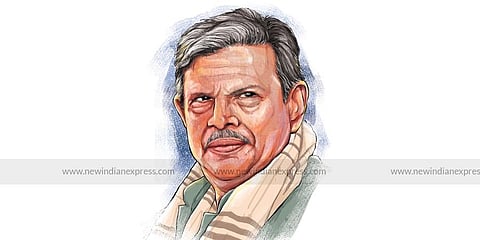Making sense of RSS' Dattatreya Hosabale's economic critique
Dattatreya Hosabale, Rashtriya Swayamsevak Sangh (RSS) general secretary and possible next in line to take over as ‘Sarsanghchalak’ after Mohan Bhagwat, has created a stir underlining the problems of poverty, inequality and unemployment – the weak underbelly of the Indian economy.
Speaking a few days before Dusshera at a webinar organized by the Swadeshi Jagran Manch, Hosabale shuffled the contours of ‘good’ and ‘evil’, evoking Ravan: “Poverty in the country is standing like a demon in front of us. It is important that we slay this demon. “Reeling off statistics, he said 20 crore Indians live below the poverty line and 23 crore earn only Rs 375 a day. On rising inequality, he said “50% Indians own just 13.5% of national income”, while 1% of the rich own a fifth of the wealth.
Quoting a “UN Observer’ – unheard of in the past – the RSS General Secretary said “large parts of India have no access to clean water or nutritious food”. He pointed to the high employment rate of 7.6%, and pooh-poohed policies that looked to urban centres to create employment, but instead turned them into living hell. Hosabale blamed “government inefficiency” and said ‘tech solutions’ was not the answer.
Applause from opponents
Opponents seized upon his speech, analysts were left scratching their heads. Shiv Sena leader Uddhav Thackeray, at his Dusshera rally in Mumbai, was all praise for Hosabale for showing the mirror to the government, saying the RSS had brought the focus on neglected economic issues.
It is ironic that much of the criticism – that there is growing inequality in the country – has been voiced earlier by organisations like Oxfam, who have recently been forced out and have had their bank accounts frozen. For instance, the data that the top 10 people in India hold 57% of the wealth, while the share of the bottom half is 13%, was first presented by Oxfam this year in January at the World Economic Forum at Davos.
In fact, poverty and income disparity are probably worse than those represented by Hosabale. The Union government says free dry rations continued during the Covid pandemic for 800 million people to keep them from the throes of hunger; and a 2020 World Economic Forum paper found some 220 million Indians survived on less than Rs 3/day (not Rs 375 a day, as claimed by Hosabale).
Some political analysts are questioning not the content, but Hosabale’s timing. With elections around the corner in 2024, is this the right time to show one’s own government in poor light? Others are asking: will there be disciplinary action against him? Opposition parties like Congress have seized on his speech saying the RSS has finally discovered there is unemployment and poverty in the country.
Refining ideology
For those who know the RSS well, much of this is kite-flying. No RSS leader commits himself without a well-thought-out agenda. Significantly, RSS chief Mohan Bhagwat, at his Nagpur Vijayadashami rally a few days later, without reference to Hosabale, supported the government. Bhagwat said the economy was fast recovering from the Covid downturn, and the future was bright and moving in the right direction.
This seems a contradiction between No.1 and No.2, but in the RSS’ scheme of things, it is not amiss. Mohan Bhagwat, at the important Dussehra Vijayadashami rally, stood with the official position – that the government is performing well. Dattatreya Hosable, on the other hand, was warning the government to take note of the growing economic headwinds in the context of the coming state and the 2024 Lok Sabha elections. It is the classical good-cop-bad-cop approach of convincing a disenchanted populace!
The RSS has managed to say relevant by constantly refining its optics. What was a narrow, Brahmin supremist organization in the early 1940s and 50s, today denies it has anything to do with caste. Sunil Ambekar, an RSS idealogue who wrote the book: ‘The RSS: Roadmaps For the 21st Century’, says the organization is “caste neutral”. “No one in the RSS is ever asked what his caste is. There is never a discussion on caste, unless there is a policy issue or a problem.”
Two rounds of UP elections were won by hammering out an alliance of OBC and scheduled castes aligning with the dominant Rajputs and other upper castes. Public postures over time have changed on the organization’s approach to Mahatma Gandhi and on women. There is double-speak too. Despite all the official Islamophobia, Sarsanghchalak Mohan Bhagwat never tires of reiterating that the RSS definition of ‘Hindu’ has nothing to do with religion.
A ‘Hindu’ is anyone who is born and has several generations of lineage in ‘Hindustan’. So it is with Hosabale. Not too much can be read into his criticism. He neither spoke out of turn nor was he saying the Modi government hadn’t performed. All he was flagging was the need to attend to growing economic concerns.

